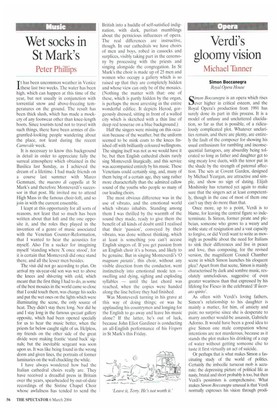Wet socks in St Mark's
Peter Phillips
It has been uncommon weather in Venice these last two weeks. The water has been high, which can happen at this time of the year, but not usually in conjunction with torrential snow and above-freezing temperatures on the ground. The result has been thick slush, which has made a mockery of any footwear other than knee-length boots. Since tourists tend not to travel with such things, there have been armies of disgruntled-looking people wandering about the place, not least during the recent Carnevae week.
It is necessary to know this background in detail in order to appreciate fully the surreal atmosphere which obtained in the Basilica last Sunday, as I achieved the dream of a lifetime, I had made friends on a course last summer with Marco Gemmani, the maestro di cappella at St Mark's and therefore Monteverdi's successor in that post. He invited me to attend High Mass in the famous choir-loft, and so join in with the current ensemble.
I leapt at this opportunity for all sorts of reasons, not least that so much has been written about that loft and the one opposite it, and the roles they played in the invention of a genre of music associated with the Venetian Counter-Reformation, that I wanted to hear the acoustics for myself. Also I'm a sucker for imagining myself 'standing where X once stood', for it is certain that Monteverdi did once stand there, and all the lesser men besides.
The visit did not go according to plan. On arrival my six-year-old son was wet to above the knees and shivering with cold, which meant that the first thing I had to do, as some of the best mosaics in the world came so close that I could touch them, was change his socks and put the wet ones on the lights which were illuminating the scene, the only source of heat. They didn't stay there long. Nor did he and I stay long in the famous spezzati gallery opposite, which had been opened specially for us to hear the music better, when the priests far below caught sight of us. Helpless, my friends on the other side of the great divide were making frantic 'stand back' signals; but the inevitable sergeant was soon upon us, It was like being found in the wrong dorm and given lines, the portraits of former luminaries on the wall chuckling the while.
I have always wondered how bad the Italian cathedral choirs really are. They have received a dreadful press in Britain over the years, spearheaded by out-of-date recordings of the Sistine Chapel Choir whose awfulness has tended to send the British into a huddle of self-satisfied indignation, with dark, puritan mumblings about the pernicious influences of opera. The real differences are instructive, though. In our cathedrals we have choirs of men and boys, robed in cassocks and surplices, visibly taking part in the ceremony by processing with the priests and singing alongside the congregation. In St Mark's the choir is made up of 25 men and women who occupy a gallery which is so raised up that they are completely hidden and whose view can only be of the mosaics. (Nothing the matter with that: one of these, which is partly hidden by the organ, is perhaps the most arresting in the entire wonderful edifice. It depicts Herod, gorgeously dressed, sitting in front of a walled city which is sketched with a thin line of deep red tesserae on a blue background.) Half the singers were missing on this occasion because of the weather, but the uniform seemed to be mink coats to the knees finished off with brilliantly coloured wellingtons. The singing itself was not as we would have it be, but then English cathedral choirs rarely sing Monteverdi liturgically, and this service was accompanied entirely by his music. These Venetians could certainly sing, and, many of them being of a certain age, they sang rather more characterfully than the admired callow sound of the youths who people so many of our leading choirs.
The most obvious difference was in the use of vibrato, and the emotional world which vibrato inhabits. Standing among them I was thrilled by the warmth of the sound they made, ready to give them the benefit of all kinds of doubt until I realised that their 'passion', conveyed by their vibrato, was done without thinking, which at least is something you can't accuse English singers of. If you get passion from an English choir it's a bonus, and likely to be genuine. But in singing Monteverdi's '0 magnum pietatis' , this choir, without any visible direction from the conductor, went instinctively into emotional mode ten — swelling and dying, sighing and exploding syllables — until the last chord was reached, when the copies were handed along the line before they had finished.
Was Monteverdi turning in his grave at this way of doing things; or was he applauding his countrymen and longing for the English to go away and leave his music alone? If the latter, he's out of luck, because John Eliot Gardiner is conducting an all-English performance of his Vespers in St Mark's this Friday.


















































































 Previous page
Previous page